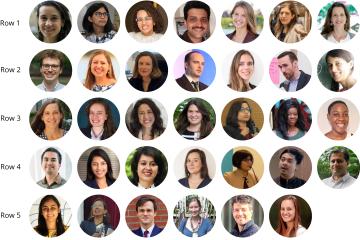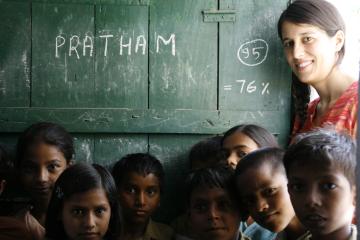
Transparent and accessible data: J-PAL alumna collaborated on an innovative approach with the Chilean government and researchers

Transparent and accessible data can be vital for researchers to better understand social problems, as well as conduct randomized evaluations that contribute to the development of evidence-informed policies. However, access to such data can be challenging. In Chile, researchers and government departments are collaborating to advance this.
RIS Investigación is a Chilean public innovation that offers access to local data through an orderly, institutionalized, and transparent system. The data comes from RIS (Social Information Registry, RIS by Spanish initials), a database managed by the Ministry of Social Development and Family that consolidates administrative data gathered by several ministries and public agencies.
Amanda Dawes, a J-PAL Latin America and the Caribbean (LAC) alumna, developed this public innovation as a civil servant in Chile's Ministry of Social Development and Family, together with the teams at the Ministry.
From J-PAL LAC, we are delighted to share the achievements of our alumni, especially when it comes to building bridges between researchers and the State. In this interview, Amanda shares details about this public innovation, its challenges, and lessons from this work that could help inform similar projects worldwide.
What is RIS Investigación?
Amanda: The RIS database is an essential part of RIS Investigación. RIS, managed by the Ministry of Social Development and Family, consolidates administrative data gathered by several ministries and public agencies. This registry contains information on people who are currently or could potentially benefit from public benefits and programs. The main objective of RIS is to provide information to national and local governments so that they can better allocate social benefits and improve policy design.
RIS Investigación is a system that allows collaboration between the Chile government and academic researchers, who have access to RIS databases. By having access to this data, researchers are able to carry out studies that contribute to the development of evidence-informed social policies that are particularly relevant to the Ministry of Social Development and Family.
Governments do not have all the answers, nor all the tools. Research exists to push the frontier of knowledge to, in this particular case, inform social policy. What we created is an orderly and transparent way for researchers to access this information, answer questions relevant to the Ministry, and at the same time protect the beneficiaries' data and their privacy. It is a process that we have created to collaborate in the generation of evidence, which is so important for decision making.
What were the major challenges in RIS Investigación’s implementation?
Amanda: Challenges came from several directions. One was regulatory—to generate a strong legal framework that would allow for a solid implementation, considering that regulatory changes tend to be slow in the public sector.
Another fundamental issue was the protection of privacy and data security. For example, we had to decide who would have access to the registry, what for, and how. A strong safeguard to protect information was a fundamental condition to move forward with the project.
Finally, it was also challenging to secure sufficient resources. While RIS Investigación was an important goal of the Ministry, resources are scarce and there are other internal priorities that sometimes—with good reason—lead to the postponement of long-term projects, such as RIS Investigación.
How do you evaluate the performance of RIS Investigación?
Amanda: The best sign for me is that both the academics and the Ministry were happy with the result. From the Ministry’s perspective, there are excellent studies being conducted by high-level academics using rigorous methodologies, which will help answer questions relevant to the Ministry and inform its policy work.
What do you consider to be the major advantage of RIS Investigación for researchers?
Amanda: The richness of the data. Data is at the individual level, covering different time periods and several topics. It allows researchers to identify relationships, such as kinship between people. It covers an extensive part of the population. Researchers recognize this value. To get access to the data, researchers have to apply with a specific study. So far, we have had forty applications, fifteen projects selected, and six studies in the evaluation process.
What do you expect the greatest contribution of RIS Investigación to be in the medium-term?
Amanda: That the studies carried out through RIS Investigación will rigorously answer questions relevant to the State's work in a timely manner and contribute to evidence to improve public policies for beneficiaries.
Is RIS Investigación replicable in other contexts?
Amanda: Yes, I believe so, but some requirements must be met. The first one is that the information exists and is linkable—meaning, one individual’s data identifiable across different databases. Linkable information allows researchers to have the “whole picture” of a person's specific situation; for example, one might know the social benefits that a person is receiving, who else lives in the individual’s household, their employment status, and so on.
On top of this, there must be an entity that has the authority to access, consolidate, and manage the information. Even if the administrative data is readily available and potential users have the ability to request it, there must be an entity whose staff have the technical capacity and time to safely gather the data and manage the databases.
When this interview was conducted in January 2022, Amanda was head of the social policy division manager at the Chilean Ministry of Social Development and Family. She is now a delivery leader at Delivery Associates.




